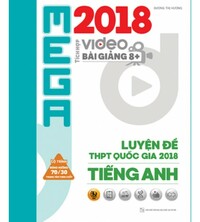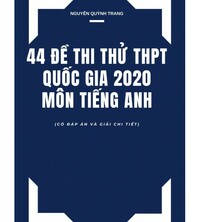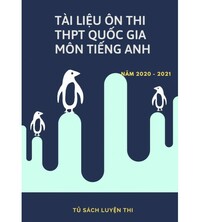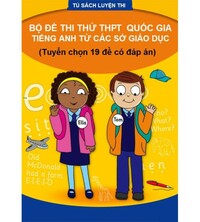Đề thi thử THPT Quốc gia năm 2017 môn Tiếng Anh có đáp án
"Học đi đôi với hành" sẽ giúp các bạn tiến bộ nhanh chóng trong tất cả các lĩnh vực. Đặc biệt, điều này luôn đúng cho các bạn thí sinh đang chuẩn bị bước vào kỳ thi TN THPT QG & ĐHCĐ năm nay. Hãy thử sức với Đề thi thử THPT Quốc gia năm 2017 môn Tiếng Anh trường THPT Tiên Du 1, Bắc Ninh có đáp án có trên Tìm Đáp Án để nâng cao kiến thức và kỹ năng làm bài thi.
Đề thi thử THPT Quốc gia năm 2017 môn Tiếng Anh trường THPT Ngô Gia Tự, Vĩnh Phúc (Lần 1)
Đề thi thử THPT Quốc gia năm 2017 môn Tiếng Anh trường THPT Chuyên Bắc Ninh có đáp án
Mark the letter A, B, C or D on your answer sheet to indicate the word whose underlined part different from the other three in pronunciation in each of the following questions.
Question 1: a. hope b. stop c. slope d. cope
Question 2: a. dates b. coughs c. rides d. looks
Mark the letter A, B, C or D on your answer sheet to indicate the word that differs from the other three in the preposition of primary stress in each of the following questions.
Question 3: a. permanent b. amazement c. tournament d. qualify
Question 4: a. scenery b. musician c. endangered d. location
Mark the letter A, B, C or D on your answer sheet to indicate the correct answer to each of the following questions.
Question 8: Psychologists have found that the number of social contacts we have__ only reason for loneliness
a. are not the b. is not the c. are not an d. is not an
Question 9: __ pack can have as big an impact on your holiday as your destination.
a. How do you b. How you c. However you d. How did you
Question 10: The polar bear's __ depends on its ability to catch fish.
a. survive b. survival c. surviving d. survivor
Question 11: You may find doing this job very __. Try it!
a. relaxed b. relaxing c. relax d. relaxation
Question 12: After visiting several areas, he realized that __ hunger was not __ only problem in that country.
a. the – the b. the – a c. x – the d. x – x
Question 13: I would advise you __ this young man despite his charming manner.
a. to trust b. not trust c. not to trust d. don't trust
Question 14: __ had they left __ their parents came.
a. No sooner – when b. No sooner – than c. Hardly – when d. b and c are correct
Question 15: Dinosaurs are thought to __ millions of years ago.
a. die out b. have died out c. having died out d. dying out
Question 16: By the time Sam got home from school, his brother __ all the cake.
a. had eaten b. has been eating c. was eating d. have eaten
Question 17: Don't make up your mind at once; __ it over with your lawyer first.
a. discuss b. debate c. argue d. talk
Question 18: Michael __ care of himself. He left home when he was 15 and has been on his own ever since.
a. used to take b. was used to taking c. is used to taking d. is used to take
Question 19: Having that accident has brought __ a complete change in his attitude to other people.
a. in b. about c. up d. out
Mark the letter A, B, C or D on your answer sheet to indicate the most suitable response to complete each of the following exchanges.
Question 20: "Is it very hot in summer here?" - "______"
a. Yes, we have high rainfall. b. Well, it's too late for the weather forecast.
c. I'm sorry. I missed the weather forecast. d. Well, it depends on rainfall.
Question 21: "Can I leave early, please?" - " ___"
a. Yes, of course b. No, certainly c. Yes, let's d. That's a good idea
Mark the letter A, B, C or D on your answer sheet to indicate the word(s) CLOSEST in meaning to the underlined word(s) in each of the following questions.
Question 22: It is imperative that they arrive on time for the lecture.
a. necessary b. suggested c. hoped d. intended
Question 23: The government has passed laws to protect wildlife from commercial trade.
a. enabled b. enforced c. enacted d. ensured
Mark the letter A, B, C or D on your answer sheet to indicate the word(s) OPPOSITE in meaning to the underlined word(s) in each of the following questions.
Question 24: I can't stand people who treat animals cruelly .
a. cleverly b. reasonably c. gently d. brutally
Question 25: Name of people in the book were changed to preserve anonymity.
a. reveal b. conserve c. cover d. presume
Mark the letter A, B, C or D on your answer sheet to indicate the sentence that is closest in meaning to each of the following questions.
Question 26: If I didn't have a car, I'd have to walk five blocks to work every day.
a. My car needs some work on it. b. I drive to work in my car every day.
c. After work every day, I walk five blocks. d. I have to walk five blocks to get to work.
Question 27: It was such a big meal that we couldn't finish it.
a. The meal was too very big for us to finish. b. The meal was too big for us to finish it.
c. The meal was too big for us to finish. d. The meal was such big that we couldn't finish it.
Question 28: I'm sure it wasn't Mr Pike you saw because he is in London.
a. It couldn't be Mr Pike you saw because he is in London.
b. It can't have been Mr Pike you saw because he is in London.
c. It mustn't have been Mr Pike you saw because he is in London.
d. It mightn't be Mr Pike you saw because he is in London.
Mark the letter A, B, C or D on your answer sheet to indicate the sentence that best combines each pair of sentences in the following questions.
Question 29: Arsenal played well. They didn't win the match.
a. Arsenal played very well and won the match.
b. Arsenal didn't win the match although they played well.
c. Arsenal didn't play well so they didn't win the match.
d. If Arsenal had played well, they could have won the match.
Question 30: He grew older. He became more and more forgetful
a. The older he grew, the more forgetful he became.
b. He grew older and more and more forgetful.
c. He became more forgetful and older.
d. He grew older when he became more forgetful.
Read the following passage and mark the letter A, B, C or D on your answer sheet to indicate the correct word or phrase that best fits each of the numbered blanks from 31 to 35.
In Part Three of the Speaking Section you work together with a partner. You have to do a single task which usually lasts about 3 minutes. One possible task is "problem solving", which means you have to look at some visual information and then (31)__ the problem with your partner. You may be shown photos, drawings, diagrams, maps, plans, advertisements or computer graphics and it is (32)__ that you study them carefully. If necessary, check you know exactly what to do by politely asking the examiner to (33)__ the instruction or make them clearer.
While you are doing the task, the examiner will probably say very (34)__ and you should ask your partner questions and make suggestions if he or she is not saying much. If either of you have any real difficulties, the examiner may decide to step in and help. Normally, however, you will find plenty to say, which helps the assessor to give you a fair mark. This mark depends on your success in doing the task by (35)__ with your partner, which includes taking turns in giving opinions and replying appropriately, although in the end it may be possible to "agree to disagree".
Question 31: a. argue b. discuss c. talk d. have
Question 32: a. essential b. needed c. helpful d. successful
Question 33: a. insist b. copy c. tell d. repeat
Question 34: a. little b. much c. few d. many
Question 35: a. competing b. struggling c. opposing d. co-operating
Read the following passage and mark the letter A, B, C or D on your answer sheet to indicate the correct answer to each of the questions from 36 to 42.
As viewed from space, Earth's distinguishing characteristics are its blue waters and white clouds. Enveloped by an ocean of air consisting of 78% nitrogen and 21% oxygen, the planet is the only one in our solar system known to harbor life. Circling the Sun at an average distance of 149 million kilometers (93 million miles), Earth is the third planet from the Sun and the fifth largest planet in the solar system.
Our planet's rapid spin and molten nickel-iron core give rise to an extensive magnetic field which, coupled the atmosphere, shields us from nearly all of the harmful radiation coming from the Sun and other stars. Earth's atmosphere protects us from meteors as well, most of which burn up in the Earth's atmosphere before they can strike the surface. The planet active geological processes have left no evidence of the ancient pelting it almost certainly received soon after it formed about 4.6 billion years ago.
The Earth has a single natural satellite – the moon.
Question 36: Approximately how much of the Earth's atmosphere is nitrogen?
a. One-fourth b. One-half c. Three-fourths d. All of it
Question 37: Which of the following helps to create the Earth's magnetic fields?
a. Its blue waters b. Its nitrogen atmosphere c. Its molten metal core d. The moon
Question 38: What two factors help protect the Earth from radiation?
a. Magnetic field and atmosphere b. Blue waters and white clouds
c. Rapid spin and molten nickel-iron core d. The Sun and the Moon
Question 39: The word consisting most nearly means __.
a. hardening b. withholding c. containing d. shortening
Question 40: The main idea of this passage is that __.
a. Earth is predominantly water. b. There are life-supporting characteristics on Earth
c. Earth is the only planet with a moon d. Earth has no common characteristics with other planets
Question 41: The word distinguishing as it is used in this selection means __.
a. elevating in nature b. characteristics like all other planets
c. devastating in nature d. characteristics that set it apart from other planets
Question 42: It's probable that the next paragraph would discuss __.
a. people on planets b. the solar system as a whole
c. rings around Saturn d. the Earth's natural satellite – the moon
Read the following passage and mark the letter A, B, C or D on your answer sheet to indicate the correct answer to each of the questions from 42 to 50.
The White House, the official home of the United States president, was not built in time for George Washington to live in it. It was begun in 1792 and was ready for its first inhabitants. President and Mrs.John Adams, who moved in on November 1, 1800. When the Adamses moved in, the White House was not yet complete, and the Adamses suffered many inconveniences; for example, the main staircase was incomplete, which hindered movement from floor to floor, and the future laundry yard was merely a pool of mud, so wet laundry was hung in the unfinished East Room to dry. Thomas Jefferson, the third president, improved the comfort of the White House in many respects and added new architectural features such as the terraces on the east and west ends.
When the British forces burned the White House on August 24, 1814, President Madison was forced to leave.All the remained after the fire was the exterior walls, the interior was completely destroyed.It was not until December of 1817 that the following president, James Monroe, was able to move into a rebuilt residence. Since then, the White House has continued to be modified but has been continuously occupied by each succeeding U.S president.
Question 43: Which of the following would be the most appropriate title for this text?
a. George Washington's life in the White House. b. The Early History of the White House.
c. The burning of the White House. d. Presidential Policies of Early U.S.Presidents.
Question 44: Why did George Washington not live in the White House?
a. It had been burned by the British.
b. He did not like the architectural features.
c. He did not want to suffer the inconveniences that the Adamses had suffered.
d. Construction had not yet been completed.
Question 45: The word "inhabitants" in line 2 is closest meaning to:
a. modifications b. moves c. celebrations d. residents
Question46: It can be inferred from the passage that John Adams was:
a. the first president of the United States. b. the second president of the United States.
c. the third president of the United States. d. the fourth president of the United States.
Question47: What of the White House was not yet complete when the Adamses moved in?
a. main staircase b. laundry yard c. pool d. A and B
Question 48: The word "forces" in line 9 could best be replaced by:
a. military b.effort c. power d. energy
Question 49: According to the passage, when James Monroe came to the White House, it had been:
a. repressed b. reconstructed c. relocated d. reserved
Question 50: The paragraph following the passage most likely discusses:
a. the details of the destruction of the White House by the British.
b. James Monroe's policies as presidents.
c. modifications by presidents who followed.
d. other presidents who were unable to occupy the White House.







